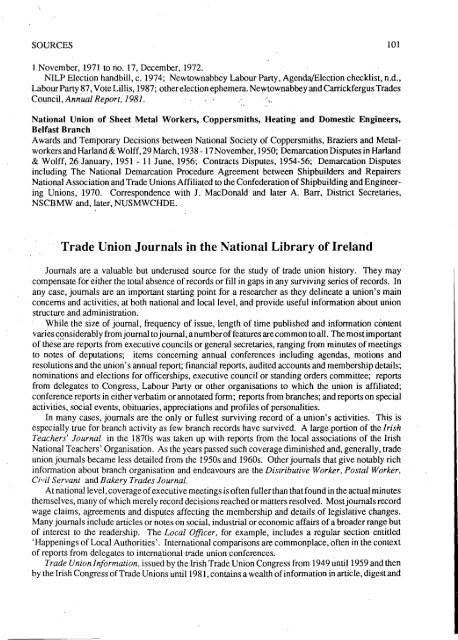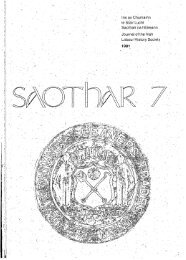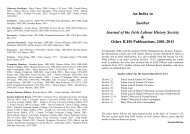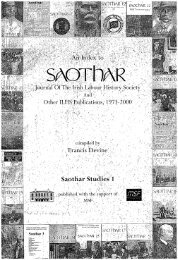100 SAOTHAR 13Francis Devine, Hugh Geraghty, Norah O'Neill, Peter Rigney and Sarah Ward-Perkins.Sean Dtinne DepositSean Dunne: born Waterford 1919. Educated Mount Sion CBS. Joined Workers' Union oflreland1936; lead 'hunger marches' 1937. Interned 1939-40, 1941 returned toworkforWUI. 1944 Secretary,Agricultural Workers' Section, WUI and founding General Secretary, Federation of Rural Workers,1946. Contested 1947 County Dublin bye-election for Labour, Labour ID for County Dublin 1948,1951, 1954. Declared bankrupt and unseated from Dail, 1956. Worked in England for a number ofyears. Regained County Dublin seat as Independent Labour in 1961 after failing to get Partynomination. Re-elected as official Labour candidate 1965 and 1969 (for Dublin South West). Died1969.Vast majority of papers are dated 1961,1964-7: mainly correspondence with individual constituents,residents' associations, Labour Party Head Office and branches; local authorities and governmentdepartments; posters, pamphlets, circulars etc. re 1961,1965 General Elections; notes from canvassingand clinics.Enrolment card into 'Boys of Pear se ',c. 1929; correspondence between Patrick Desmond (Dunne' sstepfather), Gerry Boland, Minister for Justice, William Norton and Roddy Connolly for release ofDunne from internment, 1941; miscellaneous material 1948 General Election; correspondence withFinglas constituents, 1950-51; Labour Party Manifesto, 1951; speakers' notes and election leaflet,1954; legal document re bankruptcy, 1956; type-script by W. Norton, 'The Labour Party - Policy onParticipation in Government' , n.d.'Contacts' with notes of meetings of Rush, Clondalkin, Dundrum and Balgriffen Labour PartyBranches, 1961; membership lists Rush, Balbriggan Branches Labour Party, 1961; annotated electionlists and other details 1961 election; accounts and receipts, 1961 election; pamphlet, Sean Dunne' sPlanfor Ballyfermot, n.d.; typed document 'The Labour Party: the next five years', signed B. McC.,23 March, 1965; Labour Party leaflet attacking plans to abolish PR; Abbey Theatre, 1965, 1966; EquityCalling, Annual Report Irish Actors' Equity Association 1965-6; correspondence re play DawnChorus written by Dunne and broadcast by Teleffs Eireann, 1965; 'Contacts in County Dublin', n.d.but probably 1965.Tuairisc, newsletter of MuintirWolfe Tone, no. 5, Jan-Feb, 1966; typed document 'Memo on theOffences Against the State Act, 1939, 1940' signed Con Lehane, 15 February, 1966; ConfidentialReport by Barry Desmond, Secretary Labour Party Finance Committee to AC, 31 March, 1966;Kennedy Memorial Committee, 1966; Roger Casement Commemoration Committee, 1966; AntiApartheid Movement, 1966; pamphlet For Your Tomorrow, Athlone Labour Party, n.d.; explanatorymemo to Disabled Persons (Employment) Bill moved by Dunne; and various undated correspondence,personal papers and leaflets.In addition there are a large volume of official publications, commission reports and electoraldocumentation.Northern Ireland Labour PartyMinute Book of Potting er Branch, Nll.,P, 1 February, 1968 - 17 January, 1974. J.H. Barkley's fileof Executive Council and Policy Sub-Committee Minutes, 11 February, 1973 - 3 March, 1974 includingfinance and staff matters; policy drafts on Direct Rule; Relations with the Labour Party; Towards aNew Stormont; Role of the Nll.,P; Economic and Social Policy; and Education.The Socialist, Monthly Magazine of the NILP, three issues, no. 6 March/April, 1971 to no. 9, n.d.;Labour Challenge, The Voice of Labour in Northern Ireland, vol. 1 no. 7, Sept/Oct 1971; NILPNewsletter, January, 1974; Impact, Newtownabbey Labour Party, nos . .5-7, June-August, 1971;Workers' Weekly, BelfastBulletin of the British andIrish Communist Organisation, sixteen issues fromno. 15, 14 July, 1972 to no. 110,23 May, 1974; Workers' Association Bulletin, four issues from 24August, 1974 to 5 September, 1974; The Two Nations, Workers' Association Bulletin, four issues, no.
SOURCES 101INovember, 1971 to no. 17, December, 1972.NILP Election handbill, c. 1974; Newtownabbey Labour Party, AgendaiElection checklist, n.d.,Labour Party 87, Vote Lillis, 1987; other election ephemera. Newtownabbey and Carrickfergus TradesCouncil, Annual Report, 1981.''c.National Union of Sheet Metal Workers, Coppersmiths, Heating and Domestic Engineers,Belfast BranchAwards and Temporary Decisions between National Society of Coppersmiths, Braziers and Metalworkersand Harland & Wolff, 29 March, 1938 - 17 November, 1950; Demarcation Disputes in Harland& Wolff, 26 January, 1951- 11 June, 1956; Contracts Disputes, 1954-56; Demarcation Disputesincluding The National Demarcation Procedure Agreement between Shipbuilders and RepairersNational Association and Trade Unions Affiliated to the Confederation of Shipbuilding and EngineeringUnions, 1970. Correspondence with J. MacDonald and later A. Barr, District Secretaries,NSCBMW and, later, NUSMWCHDE.Trade Union Journals in the National Library of IrelandJournals are a valuable but underused source for the study of trade union history. They maycompensate for either the total absence of records or fill in gaps in any surviving series of records. Inany case, journals are an important starting point for a researcher as they delineate a union's mainconcerns and activities, at both national and local level, and provide useful information about unionstructure and administration.While the size of journal, frequency of issue, length of time published and information contentvaries cqnsiderably from journal to journal, a number offeatures are common to all. The most importantof these are reports from executive councils or general secretaries, ranging from minutes of meetingsto notes of deputations; items concerning annual conferences including agendas, motions andresolutions and the union's annual report; financial reports, audited accounts and membership details;nominations and elections for officerships, executive council or standing orders committee; reportsfrom delegates to Congress, Labour Party or other organisations to which the union is affiliated;conference reports in either verbatim or annotated form; reports from branches; and reports on specialactivities, social events, obituaries, appreciations and profiles of personalities.In many cases, journals are the only or fullest surviving record of a union's activities. This isespecially true for branch activity as few branch records have survived. A large portion of the IrishTeachers' Journal in the 1870s was taken up with reports from the local associations of the IrishNational Teachers' Organisation. As the years passed such coverage diminished and, generally, tradeunion journals became less detailed from the 1950s and 1960s. Other journals that give notably richinformation about branch organisation and endeavours are the Distributive Worker, Postal Worker,Civil Servant and Bakery Trades Journal.At national level, coverage of executive meetings is often fuller than that found in the actual minutesthemsel ves, many of which merely record decisions reached or matters resol ved. Most journals recordwage claims, agreements and disputes affecting the membership and details of legislative changes.Many journals include articles or notes on social, industrial or economic affairs of a broader range butof interest to the readership. The Local Officer, for example, includes a regular section entitled'Happenings of Local Authorities'. International comparisons are commonplace, often in the contextof reports from delegates to intern~tionaltrade union'conferences.Trade Union Information, issued by the Irish Trade Union Congress from 1949 until 1959 and thenby the Irish Congress of Trade Unions until 1981 , contains a wealth of information in article, digest and
- Page 1 and 2:
JOURNAL OF THE IRISH LABOUR HISTORY
- Page 3 and 4:
ContentsPageEditorial: Labour Histo
- Page 5 and 6:
EDITORIAL 3freedom to participate i
- Page 7 and 8:
CorrespondenceThe Irish Labour Part
- Page 9 and 10:
; ~ ; ,The Decline and Fall of Donn
- Page 11 and 12:
THE DECLINE AND FALL OF DONNYBROOK
- Page 13 and 14:
THE DECLINE AND FALL OF DONNYBROOK
- Page 15 and 16:
·' THE DECLINE AND FALL OF DONNYBR
- Page 17 and 18:
THE DECLINE AND FALL OF DONNYBROOK
- Page 19 and 20:
THE DECLINE AND FALL OF DONNYBROOK
- Page 21 and 22:
THE DECLINE AND FALL OF DONNYBROOK
- Page 23 and 24:
THE DECLINE AND FALL OF DONNYBROOK
- Page 25 and 26:
,'-,;-''''.A PASSAGE TO BRITAIN 23C
- Page 27 and 28:
A PASSAGE TO BRITAIN 25only in the
- Page 29 and 30:
A PASSAGE TO BRITAIN 27clothing._De
- Page 31 and 32:
A PASSAGE TO BRITAIN 29established
- Page 33 and 34:
;:-.",.- .. .", ...... '.:. '
- Page 35 and 36:
LOUIE BENNETI 33feminist movement w
- Page 37 and 38:
:... ~: ."
- Page 39 and 40:
-.- '.LOUlE BENNETT 37While there i
- Page 41 and 42:
LOUIE ~ENNEIT 39Xl's encyclical Qua
- Page 43 and 44:
LOUIE BENNEIT 41Bennett's own relat
- Page 45 and 46:
LODIE BENNETT 43109; IWWU resolutio
- Page 47 and 48:
Essays in ReviewCosherers, Wanderer
- Page 49 and 50:
••• .".'. >. '~"ESSA YS IN RE
- Page 51 and 52: ESSAYS IN REVIEW 49ConnolIy:Myth an
- Page 53 and 54: ESSAYS IN ~EVIEW 51tion' in the Int
- Page 55 and 56: ESSAYS IN REVIEW53International:'I
- Page 57 and 58: REVIEWScontroversy is real history.
- Page 59 and 60: REVIEWSJoe Monks was among the earl
- Page 61 and 62: REVIEWSnolly-Column Song','Proudly
- Page 63 and 64: REVIEWSresulting from the arrival o
- Page 65 and 66: REVIEWS,63the book by means of an a
- Page 67 and 68: REVIEWSlogue, it is hardly surprisi
- Page 69 and 70: The Team For All Workers ...CULIAIB
- Page 71 and 72: ESSAYS 69mission and moral refonn.l
- Page 73 and 74: .. ...... ~.~ -~ .'- '.ESSAYS. 71fr
- Page 75 and 76: ESSAYS 73claimed authority but whic
- Page 77 and 78: ESSAYS 75provided the basis for soc
- Page 79 and 80: ESSAYS 779. For comparisons see E.T
- Page 81 and 82: ESSAYS 7952. Annals of Christ Churc
- Page 83 and 84: ESSAYS' 81Fianna Fail and the Worki
- Page 85 and 86: ESSAYS 83Eireann in 1925 visibly di
- Page 87 and 88: ESSAYS 85recognition of the impract
- Page 89 and 90: ESSAYS 871970, it created the condi
- Page 91 and 92: ESSAYS89The Irish Immigrants' Contr
- Page 93 and 94: ESSAYS" 91Although anti -Catholic p
- Page 95 and 96: ESSAYS 93McCowie played a key role
- Page 97 and 98: :. -,,'.' ',. .~.,:.ESSAYS 95Althou
- Page 99 and 100: ESSAYS 97young girl of their own ba
- Page 101: SourcesIrish Labour History Society
- Page 105 and 106: SOURCES 103would claim credit for t
- Page 107 and 108: SOURCES105Sources for Irish Labour
- Page 109 and 110: SOURCES 107NorthWest Archives and L
- Page 111 and 112: SOURCES 109In 1966 the Finnish gove
- Page 113 and 114: TURNINGANEWLEAFThe CPSSUis the larg
- Page 115 and 116: REMINISCENCE 113us due to my politi
- Page 117 and 118: REMINISCENCE 115when Jim was presen
- Page 119 and 120: REMINISCENCE 117of Dail Eireann. 17
- Page 121 and 122: REMINISCENCE 119NotesThe above arti
- Page 123 and 124: DOCUMENT STUDY 121James Connolly in
- Page 125 and 126: DOCUMENT STUDY123SOCIAL DEMOCRATIC
- Page 127 and 128: DOCUMENT STUDY 125proletariat of th
- Page 129 and 130: DOCUMENT STUDY 127the support of Je
- Page 131 and 132: DOCUMENT STUDY 12926. The Workers'
- Page 133 and 134: 131BibliographyA Bibliography of Ir
- Page 135 and 136: BIBLIOGRAPHY 133Compton, P.A. Demog
- Page 137 and 138: BIBLIOGRAPHY 135Levine, I. and Madd
- Page 139 and 140: BIBLIOGRAPHY 137Turner, M. 'Towards
- Page 141 and 142: BIBLIOGRAPHY 1394. Land and Agricul
- Page 143 and 144: BIBLIOGRAPHY 141Clogher Record12 (2
- Page 145 and 146: BIBLIOGRAPHY 143Political Research
- Page 147 and 148: BIBLIOGRAPHY 145Pres, 1987.O'Brien,
- Page 149 and 150: 147Notes on Contributorsf onathanBe
- Page 151 and 152: 1901: Ireland's first general union
- Page 153 and 154:
ELECTRICAL TRADES UNION .Establishe





